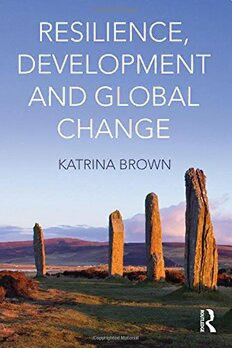Table Of ContentResilience, Development and
Global Change
Resilience is currently infusing policy debates and public discourses, widely promoted
as a normative goal in fields as diverse as the economy, national security, personal
development and well-being. This is especially so in responses to climate change,
disasters and perceived threats to food, energy and water security. Resilience,
Development and Global Change critically analyses the multiple meanings and
applications of resilience ideas in contemporary society and suggests where, how,
why and to what extent resilience might cause us to rethink global change and
development, and how a new approach might inform deliberative transform-
ative change.
The book shows how current policies adopting resilience terms and concepts
generally promote ‘business as usual’ rather than radical responses to change. It
argues, however, that resilience can help us to understand and respond to the
challenges of the contemporary age. These challenges are characterised by high
uncertainty, globalised and interconnected systems, increasing disparities and limited
choices. Resilience concepts can overturn orthodox approaches to international
development that remain dominated by modernisation, aid dependency and a focus
on economic growth; and to global environmental change, characterised by
technocratic approaches, market environmentalism and commoditisation of
ecosystem services. It presents a view of development as transformation, extending
current thinking on resilience.
Resilience, Development and Global Change presents a sophisticated, theoretically
informed synthesis of resilience thinking across disciplines, including social ecological
systems and human development. It proposes a re-visioning of resilience to meet
contemporary international development challenges highlighting hitherto neglected
areas of resistance, rootedness and resourcefulness. This re-visioning brings novel
insights to transform responses to climate change, understandings of poverty
dynamics and conceptualisation of social ecological systems. Katrina Brown provides
an original perspective for scholars of international development, environmental
studies and geography, and introduces new dimensions for those studying broader
fields of ecology and society.
Katrina Brown is Professor of Social Sciences at the Environment and Sustainability
Institute at the University of Exeter, based in Cornwall in the UK. She has a strong
commitment to interdisciplinary analysis of, and innovative approaches to,
environmental change and international development.
Resilience, Development and
Global Change
Katrina Brown
First published 2016
by Routledge
2 Park Square, Milton Park, Abingdon, Oxon OX14 4RN
and by Routledge
711 Third Avenue, New York, NY 10017
Routledge is an imprint of the Taylor & Francis Group, an informa
business
© 2016 Katrina Brown
The right of Katrina Brown to be identified as author of this work
has been asserted by her in accordance with sections 77 and 78 of the
Copyright, Designs and Patents Act 1988.
All rights reserved. No part of this book may be reprinted or
reproduced or utilised in any form or by any electronic, mechanical,
or other means, now known or hereafter invented, including
photocopying and recording, or in any information storage or
retrieval system, without permission in writing from the publishers.
Trademark notice: Product or corporate names may be trademarks
or registered trademarks, and are used only for identification and
explanation without intent to infringe.
British Library Cataloguing in Publication Data
A catalogue record for this book is available from the British Library
Library of Congress Cataloging in Publication Data
A catalog record has been requested for this book
ISBN: 978-0-415-66346-5 (hbk)
ISBN: 978-0-415-66347-2 (pbk)
ISBN: 978-0-203-49809-5 (ebk)
Typeset in Sabon
by Saxon Graphics Ltd, Derby
To James, who has taught me the most important things
about resilience, with love.
Contents
List of figures ix
List of tables x
List of boxes xi
Preface xii
Acknowledgements xiv
Introduction 1
1 Resilience now 5
Why resilience, why now? 5
Defining resilience 7
A political ecology approach 12
Framing resilience 18
Is resilience a buzzword? 28
Re-framing resilience 30
2 Development policy engagement with resilience 36
Policy arenas 36
Policy discourses on resilience 38
Interrogating climate resilient development 51
Pinning it down: measuring resilience 55
New development paradigm or business as usual? 61
3 Resilience across disciplines 69
Mapping resilience in scientific literature 69
Resilience in social ecological systems 72
Resilience in human development 80
Resilience applications 89
Navigating diverse fields and applications 93
viii Contents
4 Exploring experiential resilience 100
Understanding vulnerability and resilience 101
Everyday forms of resilience 118
Resistance, rootedness and resourcefulness 123
5 Adaptation in a changing climate 127
Adaptation and development: adaptation as development 127
Making adaptation sustainable 132
Adaptation pathways 138
Distinguishing adaptation, vulnerability and resilience 140
Applying the resilience lens 143
Understanding adaptive capacity 145
6 Traps and transformations: the resilience of poverty 156
Understanding poverty dynamics 157
Resilience insights into traps 161
Escaping traps and transformation out of poverty 167
Transforming development 176
7 Re-visioning resilience: resistance, rootedness and
resourcefulness 185
New Orleans: a tale of two cities 186
Re-visioning resilience 193
Re-conceptualising a social ecological system 199
Deliberating the future 201
Glossary 205
Index 208
Figures
1.1 Three dimensions and scales at which power operates 15
2.1 Christian Aid’s components of thriving and resilient
livelihoods 41
2.2 DFID’s four elements of a resilience framework 43
2.3 The Montpellier Panel’s agricultural growth with resilience 47
3.1 The adaptive cycle 75
3.2 Panarchy 77
3.3 A developmental-contextual model of resilience 86
3.4 Community resilience as a networked set of capacities 91
3.5 An integrated vision of community resilience 93
4.1 Bouncing back: impact of death of household head on
cultivation 108
4.2 Mozambique villager mental model of impacts of water
management 111
4.3 Tanzania villager mental model of impacts of marine
protected area 111
5.1 Resilience, adaptation and adaptedness 141
5.2 Relationships between system resilience and adaptation
processes 143
5.3a Conceptual model of gradients of adaptive capacity and
environmental susceptability and suggested governance
strategies 149
5.3b Empirical case study from five countries in the western
Indian Ocean 149
5.4 Capacities matrix 151
6.1 An heuristic model of a social ecological trap in coral reef
fisheries 165
7.1 ‘Stop calling me resilient’: New Orleans fly-posting 191

